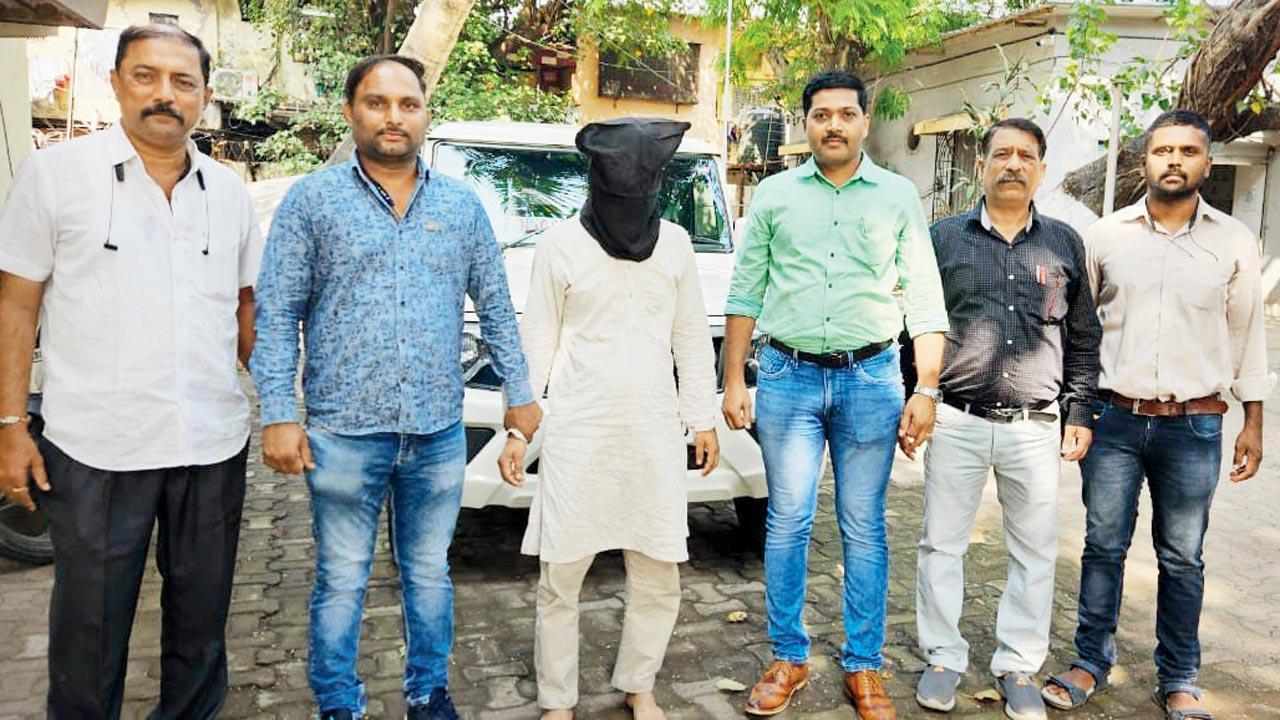Unit VI of crime branch’s investigation untangled complex web through which money was illicitly transferred across border, benefiting shady agents in both countries

Illegal Bangladeshi immigrants in police custody
This is what Unit VI of the Mumbai Crime Branch has come to learn about a decade-old complex hawala racket operating between India and Bangladesh, which came to light after officials received a tip-off from an informant about an illegal immigration agent, who was supposed to come to Sewri railway station.
ADVERTISEMENT
Unit VI arrested Akram Noor Nabi Sheikh, acting on the tip-off. Based on his confession, three more individuals were arrested within the next six days, bringing to light a nexus of hawala transactions between India and Bangladesh.
 Akram Noor Nabi Sheikh; (right) Abu Shahid Abdul Hamid Alimia
Akram Noor Nabi Sheikh; (right) Abu Shahid Abdul Hamid Alimia
The nexus worked in modules which are closely interconnected forming a complex web. The process involves receiving money from individuals in Bangladesh seeking job opportunities in India. Illegal immigration agents on the Bangladesh side assist these individuals in crossing the border. However, once in India, they require funds to settle.
Illicit transactions
According to crime branch officials, R1 is equivalent to 1.33 Bangladeshi taka as of December 18. Whenever an agent sends money from India to Bangladesh, the money is converted by the agent on the Bangladesh side of the border. If someone sends R10,000 from India, the agent in Bangladesh hands over 10,000 taka and the exchange value of 3,337 taka is his commission. The same method applies when an accused wants to send money from Bangladesh to India illegally.
These agents on the Indian side operate by creating forged documents like Aadhaar and PAN cards which are used to open bank accounts. The illegal immigrants who have just crossed the border need money to settle in India, leading to the agents on the Indian side lending money to them, earning interest on the transactions. The interest accrued is subsequently distributed on both sides of the border through a complex network connecting hawala agents in India with their counterparts in Bangladesh. Remarkably, some part of the interest earned on the money lent to individuals is sent back across the border as commission to the agents on the other side with the assistance of regular India-Bangladesh travellers, who are part of the illicit module.
Convoluted system
Similarly, many illegal Bangladeshi residing in India don’t have a bank account. To send back money to their families, they approach hawala agents on the Indian side of the border. The money in some cases is transferred by illegal Bangladeshi immigrants who for some reason want to go back to Bangladesh from India. The Indian illegal immigration agent’s Bangladeshi counterpart has been already intimated about the money that will be coming in through the border. The agent then through his chain makes sure the money reaches the family of the individual in Bangladesh.
On the other hand, families living in Bangladesh also want to send money to their relatives living in India. They contact the hawala agents on the Bangladesh side of the border and ask them to send money. The cash is sent across with the help of illegal immigrants who wish to come to India. These illegal immigration agents are instructed to hand them the money and a chit revealing to whom the money is to be delivered. The agent gives the money to the immigrant they are sending across the border. The immigrant, when inside India, meets the illicit immigration agent on the Indian side who already has been intimated that a certain amount of money needs to be given to someone in India. The immigration agent, on receiving money from the immigrant, gives it through his chain to the hawala agent concerned who then gives it to the person concerned. A part of the commission earned in this cross-border physical transfer of money is again used to help fund more illegal immigration attempts.
In other cases, when illegal immigrants residing in India or Bangladesh want to send money to their family back home, they approach a hawala agent. The latter then calls his counterpart in the other country, asking that the money be delivered to the families of the illegal immigrants, earning a commission on the transaction.
CopSpeak
A crime branch source told mid-day, “When we arrested Akram Noor Nabi Sheikh, we were not sure what exactly we were dealing with but as we continued arresting his associates and interrogating them, the picture started becoming more and more clear. By the time the fourth accused, Abu Shahid Abdul Hamid Alimia, was arrested, we became sure that a hawala racket was being operated by these individuals.”
Raj Tilak Roushan, DCP, detection 1, said, “We are investigating the matter from all angles and have apprehended 11 individuals so far. This is a big nexus and many more are suspected to be involved and will soon be arrested. The exact amount transferred via hawala is not clear yet as transactions happen by either sending chits or calls but the amount is suspected to be in lakhs and will keep increasing with every arrest we make in the case.”
11
No. of accused held so far
 Subscribe today by clicking the link and stay updated with the latest news!" Click here!
Subscribe today by clicking the link and stay updated with the latest news!" Click here!







